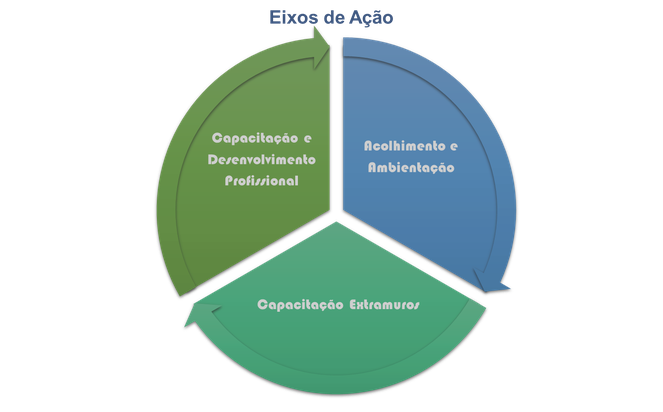About the Program

Escola Jardim is a training program for employees and contract workers of the Botanical Garden of Rio de Janeiro and partner institutions. Developed and offered by the National School of Tropical Botany - ENBT, it is committed to promoting human development through corporate education.
Objective
To establish and aggregate non-formal education programs and learning networks focused on human development, to improve people's abilities and competencies in organizational environments.
Axes of Action
Escola Jardim activities are distributed in three action axes:

The Training and Professional Development area consists of courses, workshops and lectures to improve the performance of staff and contracted employees of the BJJ, in management and administrative procedures, legislation, technical and technological activities and public visitation.
The Welcome and Familiarization axis is formed by activities to present the mission and values, history and heritage, organizational structure and spaces of the Botanical Garden to new employees, contracted employees, students and scholars, as well as occasional service providers. Besides providing the sense of institutional belonging and stimulating good coexistence in the professional environment, it promotes welcoming values, including educational and recreational activities with the participation of family members.
The Extramural Training involves training activities for teams from other institutions, particularly in demands for the implementation, structuring and development of botanical gardens, at the federal, state and municipal levels and in the development of people in other public agencies. The initiatives involve interaction with other organizations, either in the sense of providing services or collaboration agreements and partnerships.
Guidelines and scope
• Institutional and career development.
• Development of competencies and technical and scientific training.
• Creativity and innovation in teaching-learning.
• Dissemination of scientific knowledge on biodiversity.
• Social actions and integration with various sectors of society.
• Management of botanical gardens and flora conservation.
• Interpretation and environmental education and sustainable practices.
• Conservation and dissemination of scientific and historical-cultural collections.
• Critical and autonomous thinking and ethical and aesthetic sense.
Attributions
• Coordinating, developing, proposing and organizing educational programs and practices, aiming at the improvement of the organizational environment in order to accomplish the mission and reach the institutional goals of the Botanical Garden.
• To propose, promote, organize, prepare and apply courses, training sessions and other instructional activities, on-demand or continuous, presential or remote, in the scope of corporate education at the Botanical Garden of Rio de Janeiro.
• To provide administrative and logistical support for the execution of corporate education activities at the Botanical Garden, including the organization of documents and the issuing of certificates.
• Articulate with the Coordination of People Management and other sectors of the BJJ to identify training needs and propose activities, providing support for the execution of the BJJ's People Development Plan.
Pedagogical Approaches
• Combination of processes to stimulate creativity and the development of critical and autonomous thinking with theoretical content and instructional practices focused on technical-instrumental knowledge.
• Active, flexible, and continuous teaching-learning processes, aimed at solving concrete problems in the organizational environment.
• Collaborative processes between individuals, sectors, and organizations, based on interactions and exchange of experiences and learning of professional practices.
• Induction of debate, reflection, and knowledge construction environments for the proposition of innovative practices and solutions for problem solving.
• Diverse learning spaces, with activities in the classroom and in the Botanical Garden's various facilities, such as the arboretum, laboratories, collections, and historic buildings.